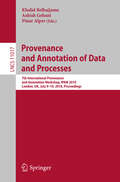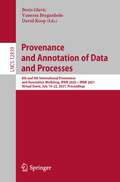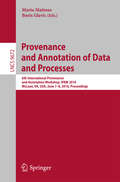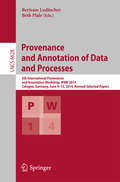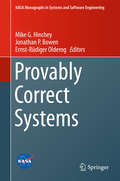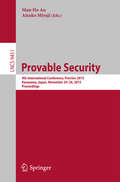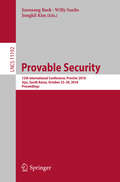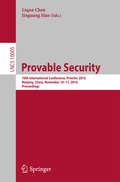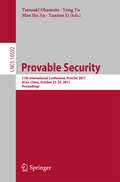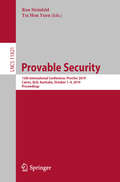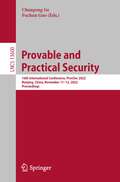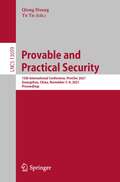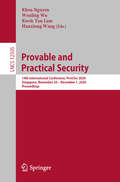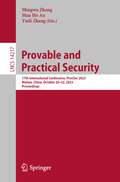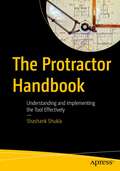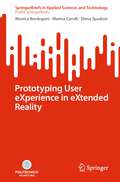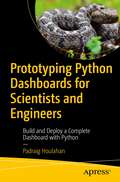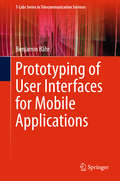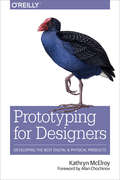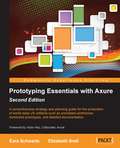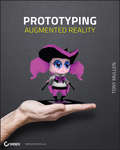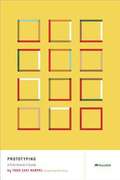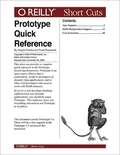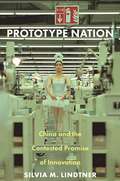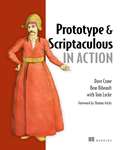- Table View
- List View
Provenance and Annotation of Data and Processes: 7th International Provenance and Annotation Workshop, IPAW 2018, London, UK, July 9-10, 2018, Proceedings (Lecture Notes in Computer Science #11017)
by Khalid Belhajjame Ashish Gehani Pinar AlperThis book constitutes the refereed proceedings of the 7th International Provenance and Annotation Workshop, IPAW 2018, held in London, UK, in July 2018.The 12 revised full papers, 19 poster papers, and 2 demonstration papers presented were carefully reviewed and selected from 50 submissions. The papers feature a variety of provenance-related topics ranging from the capture and inference of provenance to its use and application.They are organized in topical sections on reproducibility; modeling, simulating and capturing provenance; PROV extensions; scientific workflows; applications; and system demonstrations.
Provenance and Annotation of Data and Processes: 8th and 9th International Provenance and Annotation Workshop, IPAW 2020 + IPAW 2021, Virtual Event, July 19–22, 2021, Proceedings (Lecture Notes in Computer Science #12839)
by Boris Glavic Vanessa Braganholo David KoopThis book constitutes the proceedings of the 8th and 9th International Provenance and Annotation Workshop, IPAW 2020 and IPAW 2021 which were held as part of ProvenanceWeek in 2020 and 2021. Due to the COVID-19 pandemic, PropvenanceWeek 2020 was held as a 1-day virtual event with brief teaser talks on June 22, 2020. In 2021, the conference was held virtually during July 19-22, 2021. The 11 full papers and 12 posters and system demonstrations included in these proceedings were carefully reviewed and selected from a total of 31 submissions. They were organized in the following topical sections: provenance capture and representation; security; provenance types, inference, queries and summarization; reliability and trustworthiness; joint IPAW/TaPP poster and demonstration session.
Provenance and Annotation of Data and Processes
by Boris Glavic Marta MattosoThis book constitutes the refereed proceedings of the 6th International Provenance and Annotation Workshop, IPAW 2016, held in McLean, VA, USA, in June 2016. The 12 revised full papers, 14 poster papers, and 2 demonstration papers presented were carefully reviewed and selected from 54 submissions. The papers feature state-of-the-art research and practice around the automatic capture, representation, and use of provenance. They are organized in topical sections on provenance capture, provenance analysis and visualization, and provenance models and applications.
Provenance and Annotation of Data and Processes
by Bertram Ludäscher Beth PlaleThis book constitutes the revised selected papers of the 5th International Provenance and Annotation Workshop, IPAW 2014, held in Cologne, Germany in June 2014. The 14 long papers, 20 short papers and 4 extended abstracts presented were carefully reviewed and selected from 53 submissions. The papers include tools that enable provenance capture from software compilers, from web publications and from scripts, using existing audit logs and employing both static and dynamic instrumentation.
Provably Correct Systems
by Mike G. Hinchey Jonathan P. Bowen Ernst-Rüdiger OlderogAs computers increasingly control the systems and services we depend upon within our daily lives like transport, communications, and the media, ensuring these systems function correctly is of utmost importance. This book consists of twelve chapters and one historical account that were presented at a workshop in London in 2015, marking the 25th anniversary of the European ESPRIT Basic Research project 'ProCoS' (Provably Correct Systems). The ProCoS I and II projects pioneered and accelerated the automation of verification techniques, resulting in a wide range of applications within many trades and sectors such as aerospace, electronics, communications, and retail. The following topics are covered: An historical account of the ProCoS project Hybrid Systems Correctness of Concurrent Algorithms Interfaces and Linking Automatic Verification Run-time Assertions Checking Formal and Semi-Formal Methods Provably Correct Systems provides researchers, designers and engineers with a complete overview of the ProCoS initiative, past and present, and explores current developments and perspectives within the field.
Provable Security
by Man-Ho Au Atsuko MiyajiThis book constitutes the refereed proceedings of the 9th International Conference on Provable Security, ProvSec 2015, held in Kanazawa, Japan, in November 2015. The 19 full papers and 7 short papers presented together with 3 invited talks were carefully reviewed and selected from 60 submissions. The papers are grouped in topical sections on fundamental, protocol, authenticated encryption and key exchange, encryption and identification, privacy and cloud, leakage-resilient cryptography and lattice cryptography, signature and broadcast encryption.
Provable Security: 12th International Conference, ProvSec 2018, Jeju, South Korea, October 25-28, 2018, Proceedings (Lecture Notes in Computer Science #11192)
by Joonsang Baek Willy Susilo Jongkil KimThis book constitutes the refereed proceedings of the 12th International Conference on Provable Security, ProvSec 2018, held in Jeju, South Korea, in October 2018. The 21 full and 4 short papers presented were carefully reviewed and selected from 48 submissions. The papers are grouped in topical sections on foundation. Public key encryption, digital signature, symmetric key cryptography, and applications.
Provable Security
by Liqun Chen Jinguang HanThis book constitutes the refereed proceedings of the 10th International Conference on Provable Security, ProvSec 2016, held in Nanjing, China, in November 2016. The 17 full papers and 6 short papers presented were carefully reviewed and selected from 79 submissions. The papers are grouped in topical sections on attribute/role-based cryptography, data in cloud, searchable encryption, key management, encryption, leakage analysis, homomorphic encryption.
Provable Security
by Tatsuaki Okamoto Yong Yu Man Ho Au Yannan LiThis book constitutes the refereed proceedings of the 11th International Conference on Provable Security, ProvSec 2017, held in Xi'an, China, in October 2017. The 24 full papers and 5 short papers presented were carefully reviewed and selected from 76 submissions. The papers are grouped in topical sections on secure cloud storage and computing; digital signature and authentication; authenticated encryption and key exchange; security models; lattice and post-quantum cryptography; public key encryption and signcryption; proxy re-encryption and functional encryption; protocols.
Provable Security: 13th International Conference, ProvSec 2019, Cairns, QLD, Australia, October 1–4, 2019, Proceedings (Lecture Notes in Computer Science #11821)
by Ron Steinfeld Tsz Hon YuenThis book constitutes the refereed proceedings of the 13th International Conference on Provable Security, ProvSec 2019, held in Cairns, QLD, Australia, in October 2019. The 18 full and 6 short papers presented were carefully reviewed and selected from 51 submissions. The papers focus on provable security as an essential tool for analyzing security of modern cryptographic primitives, including a special theme on “Practical Security.”
Provable and Practical Security: 16th International Conference, ProvSec 2022, Nanjing, China, November 11–12, 2022, Proceedings (Lecture Notes in Computer Science #13600)
by Chunpeng Ge Fuchun GuoThis book constitutes the refereed proceedings of the 16th International Conference on Provable Security, ProvSec 2022, held in Nanjing, China, in November 11–12,2022. The 15 full papers and 4 short papers were presented carefully reviewed and selected from 52 submissions. The papers focus on provable security as an essential tool for analyzing security of modern cryptographic primitives. They are divided in the following topical sections: Encryption; Lattice Based Cryptography; Information Security; Blockchain; and Foundations.
Provable and Practical Security: 15th International Conference, ProvSec 2021, Guangzhou, China, November 5–8, 2021, Proceedings (Lecture Notes in Computer Science #13059)
by Qiong Huang Yu YuThis book constitutes the refereed proceedings of the 15th International Conference on Provable Security, ProvSec 2021, held in Guangzhou, China, in November 2021. The 21 full papers presented were carefully reviewed and selected from 67 submissions. The papers focus on provable security as an essential tool for analyzing security of modern cryptographic primitives. They are divided in the following topical sections: Searchable Encryption, Key Exchange & Zero Knowledge Proof, Post Quantum Cryptography, Functional Encryption, Digital Signature, and Practical Security Protocols.
Provable and Practical Security: 14th International Conference, ProvSec 2020, Singapore, November 29 – December 1, 2020, Proceedings (Lecture Notes in Computer Science #12505)
by Khoa Nguyen Wenling Wu Kwok Yan Lam Huaxiong WangThis book constitutes the refereed proceedings of the 14th International Conference on Provable Security, ProvSec 2020, held in Singapore, in November 2020. The 20 full papers presented were carefully reviewed and selected from 59 submissions. The papers focus on provable security as an essential tool for analyzing security of modern cryptographic primitives. They are divided in the following topical sections: signature schemes, encryption schemes and NIZKS, secure machine learning and multiparty computation, secret sharing schemes, and security analyses.* The conference was held virtually due to the COVID-19 pandemic.
Provable and Practical Security: 17th International Conference, ProvSec 2023, Wuhan, China, October 20–22, 2023, Proceedings (Lecture Notes in Computer Science #14217)
by Mingwu Zhang Man Ho Au Yudi ZhangThis volume LNCS 14217 constitutes the refereed proceedings of the 17th International Conference on Provable and Practical Security, ProvSec 2023, held in Wuhan, China, during October 2023. The 20 full papers presented together with 3 short papers were carefully reviewed and selected from 71 submissions. The conference focuses on Fundamentals & Cryptographic Primitives; Cryptanalysis; Signature; Encryption; Privacy Preservation; and Blockchain Security.
The Protractor Handbook: Understanding and Implementing the Tool Effectively
by Shashank ShuklaLearn to quickly set up Protractor and dive into the amazing possibilities that this tool offers for automating browser interactions for a user for any Angular web application. Software testing is here to stay, and an integral part of this is test automation. Protractor is one of the most evolved test automation frameworks that every software testing professional working with an Angular application should know.You will to automate a vast range of actions that a user takes to interact with the browser. From a simple ‘click’ to more complex user actions such as frame switches, selecting from drop-downs, and file downloads using Protractor APIs for Angular-based websites. You will also learn about assertions, timeouts, waits, parallel testing frameworks that are available, and the general pros and cons you should be aware of. With over 150 working code samples demonstrating various test scenarios that you require in your day-to-day automation testing, and examples that may be given in interviews, this book will be your practical handbook to all the key Protractor API implementations. What You'll Learn Set up and install Protractor efficientlyImplement Angular-specific locator strategiesAutomate Angular web pagesRun parallel execution using ProtractorExplore all the pros, cons and challenges you may face while using ProtractorUse specific notes around each API to ensure optimum usage and avoid common mistakes Who This Book Is For Ideal for test engineers who have a basic understanding of test automation with Selenium, developers who want to implement this testing tool for internal testing, Test Managers/IT Project Managers who want to get some general understanding of this tool and its advantages, and students who want to pursue career in test automation.
Prototyping User eXperience in eXtended Reality (SpringerBriefs in Applied Sciences and Technology)
by Monica Bordegoni Marina Carulli Elena SpadoniThis book examines two topics in the context of product design and enabling technologies: User eXperience (UX) and eXtended Reality (XR). UX regards the ways in which people interact with the environment and with objects and is considered of primary importance in many contexts. When developing new products, UX must be carefully designed and evaluated directly with the users. Prototyping is a well-known, effective, and widely used practice for design evaluation. The book describes how prototyping based on XR technologies, including Virtual, Augmented and Mixed Reality, is a suitable approach for testing ideas and products without fully physically building them. The major benefits, which are well explained and demonstrated in this book, consist in allowing users to experience products, including their appearance, functions, and usability, in a digital context that can be easily modified and customized according to the users’ feedback and the context of use. The audience of the book includes graduate students who wish to learn more about prototyping methods and technologies and product and digital application designers who can deepen their knowledge on advanced digital technologies for evaluating the designs of products and experiences.
Prototyping Python Dashboards for Scientists and Engineers: Build and Deploy a Complete Dashboard with Python
by Padraig HoulahanCreate interactive and data-driven dashboards using Python. This hands-on guide is a practical resource for those (with modest programming skills) in scientific and engineering fields looking to leverage Python's power for data visualization and analysis in a user-friendly dashboard format. You’ll begin by gaining a fundamental understanding of Python programming, including data types, lists, dictionaries, and data structures. The book then delves into the world of reactive programming with Plotly and Dash, offering a hands-on approach to building interactive web-based dashboards. Next, you’ll see how to work with online data, how to scrape and clean datasets, and keep files up-to-date. The book also guides you through planning a dashboard prototype, outlining project tasks, trends, forecasts, spectra, and other design considerations. It concludes with a discussion of how the dashboard can be used for data visualization of real data, explaining the usefulness of tools such as spectra. By providing detailed examples for download and customization, Prototyping Python Dashboards for Scientists and Engineers will equip you with the skills needed to jumpstart your own development efforts. What You’ll Learn Design a dashboard with PythonConvert and filter Excel formatted files to produce CSV filesCreate browser-served graphics with PLOTLYGenerate polynomial trend lines for forecastingBuild a Unix service to share your dashboard Who This Book Is For Scientists, engineers, students, programmers, and data enthusiasts who aspire to harness Python's potential for data visualization and analysis through the creation of interactive dashboards. Many will be pragmatic programmers with modest skills and limited resources who mainly want to see a working solution they could emulate.
Prototyping of User Interfaces for Mobile Applications (T-Labs Series in Telecommunication Services)
by Benjamin BährThis book investigates processes for the prototyping of user interfaces for mobile apps, and describes the development of new concepts and tools that can improve the prototype driven app development in the early stages. It presents the development and evaluation of a new requirements catalogue for prototyping mobile app tools that identifies the most important criteria such tools should meet at different prototype-development stages. This catalogue is not just a good point of orientation for designing new prototyping approaches, but also provides a set of metrics for a comparing the performance of alternative prototyping tools. In addition, the book discusses the development of Blended Prototyping, a new approach for prototyping user interfaces for mobile applications in the early and middle development stages, and presents the results of an evaluation of its performance, showing that it provides a tool for teamwork-oriented, creative prototyping of mobile apps in the early design stages.
Prototyping for Designers: Developing the Best Digital and Physical Products
by Kathryn McelroyPrototyping and user testing is the best way to create successful products, but many designers skip this important step and use gut instinct instead. By explaining the goals and methodologies behind prototyping—and demonstrating how to prototype for both physical and digital products—this practical guide helps beginning and intermediate designers become more comfortable with creating and testing prototypes early and often in the process.Author Kathryn McElroy explains various prototyping methods, from fast and dirty to high fidelity and refined, and reveals ways to test your prototypes with users. You’ll gain valuable insights for improving your product, whether it’s a smartphone app or a new electronic gadget.Learn similarities and differences between prototyping for physical and digital productsKnow what fidelity level is needed for different prototypesGet best practices for prototyping in a variety of mediums, and choose which prototyping software or components to useLearn electronics prototyping basics and resources for getting startedWrite basic pseudocode and translate it into usable code for ArduinoConduct user tests to gain insights from prototypes
Prototyping Essentials with Axure Second Edition
by Elizabeth Srail Ezra SchwartzA handson guide filled with practical examples to device/OS independent User Experience Strategy with Axure 7. If you are a UX practitioner, a business analyst involved UX projects, or a product manager involved in UX projects, this book is for you. Consultants or inhouse staff who work for agencies or individual practitioners will also benefit from this book. Familiarity with Axure will help but is not mandatory.
Prototyping Augmented Reality
by Tony MullenLearn to create augmented reality apps using Processing open-source programming language Augmented reality (AR) is used all over, and you may not even realize it. Smartphones overlay data onto live camera views to show homes for sale, restaurants, or historical sites. American football broadcasts use AR to show the invisible first-down line on the field to TV viewers. Nike and Budweiser, among others, have used AR in ads. Now, you can learn to create AR prototypes using 3D data, Processing open-source programming language, and other languages. This unique book is an easy-to-follow guide on how to do it. Guides you through the emerging technology of Augmented Reality (AR) Shows you how to use 3D data with the Processing programming environment and other languages to create AR prototypes for the web, smartphones, Macs, and PCs Helps 3D artists and designers who want to move into the AR market but don't have programming skills Covers the essentials of 3D programming, creating objects for an AR library, building and exporting 3D models, and much more Explains how to interactively link 3D to physical, virtual, and streaming environments Author Tony Mullen is both an artist and a programmer and perfectly suited to explain how to bridge these two worlds, as he so deftly does in Prototyping with Augmented Reality.
Prototyping
by Todd Zaki WarfelPrototyping is a great way to communicate the intent of a design both clearly and effectively. Prototypes help you to flesh out design ideas, test assumptions, and gather real-time feedback from users.With this book, Todd Zaki Warfel shows how prototypes are more than just a design tool by demonstrating how they can help you market a product, gain internal buy-in, and test feasibility with your development team.
Prototype Quick Reference
by Scott Raymond Sergio PereiraThis short cut provides a complete quick reference to the Prototype JavaScript framework. Prototype is an open-source library that is particularly useful to developers of dynamic Ajax applications, and to other web developers who need to work with DOM elements. If you're a web developer building sophisticated, user-friendly applications, you should be using Prototype. This reference gives you everything you need to use Prototype to its fullest.This document covers Prototype 1.4. There will be a free upgrade to the Prototype 1.5 version of this document.
Prototype Nation: China and the Contested Promise of Innovation (Princeton Studies in Culture and Technology #29)
by Silvia M. LindtnerA vivid look at China’s shifting place in the global political economy of technology production How did China’s mass manufacturing and “copycat” production become transformed, in the global tech imagination, from something holding the nation back to one of its key assets? Prototype Nation offers a rich transnational analysis of how the promise of democratized innovation and entrepreneurial life has shaped China’s governance and global image. With historical precision and ethnographic detail, Silvia Lindtner reveals how a growing distrust in Western models of progress and development, including Silicon Valley and the tech industry after the financial crisis of 2007–8, shaped the rise of the global maker movement and the vision of China as a “new frontier” of innovation.Lindtner’s investigations draw on more than a decade of research in experimental work spaces—makerspaces, coworking spaces, innovation hubs, hackathons, and startup weekends—in China, the United States, Africa, Europe, Taiwan, and Singapore, as well as in key sites of technology investment and industrial production—tech incubators, corporate offices, and factories. She examines how the ideals of the maker movement, to intervene in social and economic structures, served the technopolitical project of prototyping a “new” optimistic, assertive, and global China. In doing so, Lindtner demonstrates that entrepreneurial living influences governance, education, policy, investment, and urban redesign in ways that normalize the persistence of sexism, racism, colonialism, and labor exploitation.Prototype Nation shows that by attending to the bodies and sites that nurture entrepreneurial life, technology can be extricated from the seemingly endless cycle of promise and violence.Cover image: Courtesy of Cao Fei, Vitamin Creative Space and Sprüth Magers
Prototype and Scriptaculous in Action
by Tom Locke Bear Bibeault Dave CranePrototype and Scriptaculous are libraries that extend standard Ajax. They make it easier to program Ajax and provide powerful features like drag and drop and animation. In this book, developers learn by playing and see how the libraries work in the real world.As experience with Ajax increases, developers want the standard Ajax capabilities they repeatedly use to be preprogrammed for them--and that's exactly what Ajax libraries do for them. They reduce the pain of handling cross-browser inconsistencies, they add useful language features, and provide sophisticated functionality. Of these, Prototype is the most popular JavaScript and Ajax framework for low-level user interface features such as animation, drag and drop, and pre-built widgets. Together, they free the developer up to concentrate on building the application. They make a rich user experience easy to achieve.This book guides the reader through the Prototype and Scriptaculous libraries feature-by-feature. In just 350 pages, readers will find over 100 small working examples to help them explore the libraries. As well, they will develop a web-based image gallery that teacher them how to use Prototype and Scriptaculous in the real-world. Purchase of the print book comes with an offer of a free PDF, ePub, and Kindle eBook from Manning. Also available is all code from the book.
